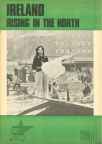EPISODES IN BIG FLAME HISTORY: No 9. Ireland
Posted by archivearchie on June 17, 2009
When Big Flame became a national organisation in 1975, the minimum political agreement for the group stated: “We oppose British involvement in Northern Ireland, and support the republican and revolutionary demands for troops out now, for self determination for Irish people as a whole, and for a united socialist Ireland”. In the years that followed motions on Ireland at Big Flame Conferences repeatedly contained the slogans of the Troops Out Movement: “Troops Out Now” and “Self Determination for the Irish People as a Whole”. Sometimes with an additional one along the lines of “Solidarity with all forces fighting British Imperialism in Ireland”.
Big Flame’s only extended discussion of Ireland was in a 1975 pamphlet Ireland: Rising in the North. The analysis in the pamphlet was largely similar to that of many other left groups: The origin of the situation in the north of Ireland was traced back to British imperialism and the partition of the country. The introduction of British troops was seen not as move not to keep the peace, but to contain Catholic rebellion. However, there were also two themes not so commonly found in other discussions:
(a) An emphasis on the “creative and revolutionary power” of the working class in Ireland. Shown for example in the “massive community mobilisation” in 1972 which led to the abolition of Stormont – the street demonstrations, rioting, strikes, and the withholding of rent, rates and utilities payments.
(b) The differences between the Catholic and Loyalist communities were based in real divisions in the working class, material interests which could not be wished away. Big Flame saw this as a lesson for Britain, where divisions in the working class (e.g. on the basis of race) also needed to be acknowledged.
Another aspect of the pamphlet was the fear that the Government might impose a Loyalist takeover, relying on the war weariness of the Catholic population to achieve this end. This didn’t happen in the form anticipated in the 1970s, although some might argue in the light of recent developments that this perspective was somewhat prescient.
Click here to view the pamphlet – split into three parts [warning: downloading may take some time]:
Ireland: Rising in the North: front-p12
Ireland: Rising in the North: p13-p22
Ireland: Rising in the North: p23-back
Obviously this pamphlet wasn’t the only place where Ireland was discussed. There was a regular series of a bulletin Irish Struggle Notes and extensive coverage in the newspaper (including a history of the last ten years in Ireland published in 1978-79).
Troops Out Movement
The Troops Out Movement (TOM) was founded in October 1973 by six people, two of whom were Big Flame militants. Over the next few years, when most left groups abandoned Irish solidarity work, Big Flame had a record of consistent activity. Then when some left groups sought to take over TOM, Big Flame’s so-called “community orientated” approach to solidarity work was dismissed. The BF perspective was the subject to caricature. It was not against work in Parliament, the trade union movement and the Labour Party. It was against these being the sole work for TOM.
This report to the October 1976 Big Flame Conference has a lot of detail about exactly what was happening in that year. It also has an interesting discussion of debates within TOM between those solely interested in work in the labour movement, and those who also advocate “mass work” in local areas, with Irish people, school children, students, etc. Click here to view Irish Commission Report.
Big Flame saw the question of Ireland as something all members should raise, not just those with Irish solidarity as a specific work area. This document written in the lead up to the November 1979 Big Flame Conference was a guide for how this could be done. Click here to view But How Can I Raise the Question of Ireland from Day to Day? [warning: because this document was printed on a coloured background, it is difficult to read in places].
Unconditional Support
At its November 1981 conference Big Flame passed a motion on Irish and other international solidarity work. This sought to remedy an apparent contradiction, which occurred at the 1980 conference when the position set out below was adopted for international solidarity work in general, but for Ireland it was agreed that “any criticism we may have would only be made within the anti-imperialist and solidarity movements”. The position agreed in 1981 was:
“We are in solidarity with all national liberation struggles which are anti-imperialist. We do not make our support for these struggles conditional on them being struggles for socialism. In our solidarity work we give support specifically to those forces carrying forward the socialist and/or feminist and/or anti-racist and/or gay struggles.
…We retain the right to criticise any national liberation struggle because we are concerned with developing an opposition to imperialism the world over – not just in one country. And because we recognise that in itself ‘anti-imperialism’ may not be progressive in the sense of advocacy of the workers, women, peasant and gay movements. Any criticisms we make of a national liberation movement must be made within the general context of solidarity and on the basis of a thorough understanding of the history of the movement and the conditions and needs of its struggle.”
An article in the Discussion Bulletin of March 1983 explains the issues which lay behind the motion: the difficulties campaigners for Irish self determination face in making any criticisms of groups in Ireland in a climate of anti-Irish hysteria. The article was in response to the approach of the Socialist Workers Party (SWP). Click here to view SWP and Ireland.
Bombings in England
Big Flame was careful in exercising its right to criticise. Such criticisms as were made publicly were oblique and highly qualified. An article in the newspaper no5 Nov-Dec 1972 said that oppressed people in Ireland had the right to use violence, but it did not “necessarily agree with every single act”. In no 23 Dec 1974 the Birmingham bombings were condemned, but attributed to the British presence in Ireland. A further article in no 77 Aug 1979 said of the Provisionals “they may have used tactics we in Big Flame disagree with”.
The November 1979 Big Flame Conference documents included a debate on responding to Irish military activity in England. The first article argues that “moral grounds” can enter into judgements of actions as well as their political objectives, and that a sustained military campaign in Britain could be counter productive to the objective of the withdrawal of British troops. The second article starts from the position that Big Flame has the right to criticise publicly if that is its view. It then goes on to argue that bombings do not aid an anti-war movement. The author’s position is distinguished from one based on “abstract moral rules”. Click here to view Discussion on Ireland and Contribution to the debate on Ireland .
Archive Archie



Rosa Vilbr said
I work for a community history organisation – Eastside Community Heritage and I am currently carrying out a series of oral history interviews with people who were involved in the Troops Out Movement and related campaigns around British withdrawal.
I would really like to talk to someone from Big Flame who was involved in work around Ireland. Interviews can take place whereever the interviewee is most comfortable, and whenever is convenient. Please contact me on 0208 553 4343 or on rosa@ech.org.uk
Thanks for this site as well by the way, its really useful and interesting.
all the best,
Rosa Vilbr
liberationirlande said
Hello!
A part of the pamphlet – about Loyalism – has been translated into French, see here :